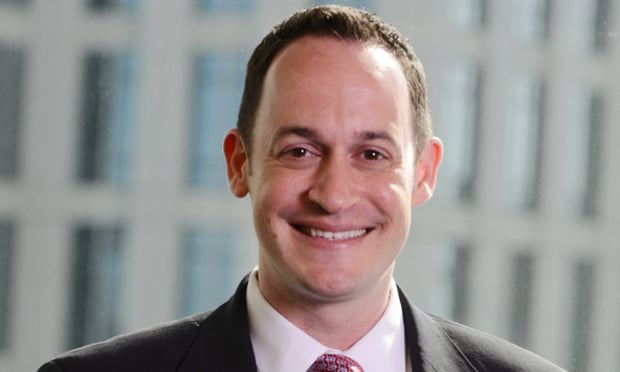 Andrew “Drew” Hinkes, General Counsel of Athena Blockchain.
Andrew “Drew” Hinkes, General Counsel of Athena Blockchain. As JP Morgan Ventures Into Cryptocurrency, a Blockchain General Counsel Spells Out What It Means
It's the first move by a U.S. bank—the nation's largest at more than $2.6 trillion in assets—and is likely to make a significant impact on banking, cryptocurrency and the economy, he said.
February 21, 2019 at 01:31 PM
4 minute read
The original version of this story was published on Corporate Counsel
JPMorgan Chase & Co.'s announcement last week that it has developed and tested its own digital coin, called JPM Coin, is a huge fintech development, said Andrew “Drew” Hinkes, general counsel, chief legal officer and partner of Athena Blockchain, an advisory firm that helps companies issue securities in token form.
It's the first move by a U.S. bank—the nation's largest at more than $2.6 trillion in assets—and is likely to make a significant impact on banking, cryptocurrency and the economy, he said.
“The largest bank in the U.S. is making a very smart play to capture a lot of capital and a very unique data set, and to minimize fees in a unique way going forward,” Hinkes said.
The project involves a number of regulatory issues that need to be addressed, including state and federal money transmitter laws. Those issues involve agencies such as the U.S. Securities and Exchange Commission, the Commodity Futures Trading Commission and the Financial Industry Regulatory Authority. The bank's attorneys likely began discussing the project with regulators long before the bank's plans were announced, Hinkes said.
As for what this development means for attorneys practicing in fintech and financial services in general, Hinkes said clients will want to understand how this changes their banking relationships.
“Counsel needs to understand the technology in the difference between public and private systems to advise their clients as to the impact of these new technologies,” Hinkes said. “Financial services companies need to understand how this development may change their financial relationships. And privacy advocates may be concerned about the centralization of private financial data.”
JP Morgan said it successfully created a digital token with a stable value tied 1:1 to the U.S. dollar, based on blockchain technology allowing immediate transfer of payments between institutional accounts. When one bank client sends money to another using their Quorum blockchain, the digital coins will be transferred and redeemed for the equivalent amount of dollars, reducing the time it takes to settle a transaction, the bank said in a statement. The virtual coin is a prototype that will be tested with institutional clients in business-to-business transactions, and it has not yet been approved by regulators.
“As we move towards production we will actively engage our regulators to explain its design and solicit their feedback and any necessary approvals,” said the statement attributed to Umar Farooq, head of digital treasury services and blockchain at JP Morgan.
Asked for further comment, a spokesperson for the bank referred back to the statement.
Hinkes, who is also an adjunct professor at New York University School of Law and NYU Stern School of Business, said, “This allows [JPMorgan] conceptually to capture massive amounts of client money and move it in token form instead of in actual cash form, which saves tremendously on fees, and will allow the bank to capture data about transactions that no one else will have.”
Unlike Bitcoin or Ether, it is not on a public network where transactions are validated by multiple distributed parties.
JP Morgan's announcement came as a surprise to some observers because Chairman and CEO Jamie Dimon expressed disdain for bitcoin, calling it at various times “a terrible store of value” in 2014 and “a fraud” 2017.
Read More:
This content has been archived. It is available through our partners, LexisNexis® and Bloomberg Law.
To view this content, please continue to their sites.
Not a Lexis Subscriber?
Subscribe Now
Not a Bloomberg Law Subscriber?
Subscribe Now
NOT FOR REPRINT
© 2024 ALM Global, LLC, All Rights Reserved. Request academic re-use from www.copyright.com. All other uses, submit a request to [email protected]. For more information visit Asset & Logo Licensing.
You Might Like
View All

'Almost Impossible'?: Squire Challenge to Sanctions Spotlights Difficulty of Getting Off Administration's List
4 minute read
Trump Mulls Big Changes to Banking Regulation, Unsettling the Industry

The Week in Data Dec. 13: A Look at Legal Industry Trends by the Numbers
Trending Stories
- 1Senate Judiciary Dems Release Report on Supreme Court Ethics
- 2Senate Confirms Last 2 of Biden's California Judicial Nominees
- 3Morrison & Foerster Doles Out Year-End and Special Bonuses, Raises Base Compensation for Associates
- 4Tom Girardi to Surrender to Federal Authorities on Jan. 7
- 5Husch Blackwell, Foley Among Law Firms Opening Southeast Offices This Year
Who Got The Work
Michael G. Bongiorno, Andrew Scott Dulberg and Elizabeth E. Driscoll from Wilmer Cutler Pickering Hale and Dorr have stepped in to represent Symbotic Inc., an A.I.-enabled technology platform that focuses on increasing supply chain efficiency, and other defendants in a pending shareholder derivative lawsuit. The case, filed Oct. 2 in Massachusetts District Court by the Brown Law Firm on behalf of Stephen Austen, accuses certain officers and directors of misleading investors in regard to Symbotic's potential for margin growth by failing to disclose that the company was not equipped to timely deploy its systems or manage expenses through project delays. The case, assigned to U.S. District Judge Nathaniel M. Gorton, is 1:24-cv-12522, Austen v. Cohen et al.
Who Got The Work
Edmund Polubinski and Marie Killmond of Davis Polk & Wardwell have entered appearances for data platform software development company MongoDB and other defendants in a pending shareholder derivative lawsuit. The action, filed Oct. 7 in New York Southern District Court by the Brown Law Firm, accuses the company's directors and/or officers of falsely expressing confidence in the company’s restructuring of its sales incentive plan and downplaying the severity of decreases in its upfront commitments. The case is 1:24-cv-07594, Roy v. Ittycheria et al.
Who Got The Work
Amy O. Bruchs and Kurt F. Ellison of Michael Best & Friedrich have entered appearances for Epic Systems Corp. in a pending employment discrimination lawsuit. The suit was filed Sept. 7 in Wisconsin Western District Court by Levine Eisberner LLC and Siri & Glimstad on behalf of a project manager who claims that he was wrongfully terminated after applying for a religious exemption to the defendant's COVID-19 vaccine mandate. The case, assigned to U.S. Magistrate Judge Anita Marie Boor, is 3:24-cv-00630, Secker, Nathan v. Epic Systems Corporation.
Who Got The Work
David X. Sullivan, Thomas J. Finn and Gregory A. Hall from McCarter & English have entered appearances for Sunrun Installation Services in a pending civil rights lawsuit. The complaint was filed Sept. 4 in Connecticut District Court by attorney Robert M. Berke on behalf of former employee George Edward Steins, who was arrested and charged with employing an unregistered home improvement salesperson. The complaint alleges that had Sunrun informed the Connecticut Department of Consumer Protection that the plaintiff's employment had ended in 2017 and that he no longer held Sunrun's home improvement contractor license, he would not have been hit with charges, which were dismissed in May 2024. The case, assigned to U.S. District Judge Jeffrey A. Meyer, is 3:24-cv-01423, Steins v. Sunrun, Inc. et al.
Who Got The Work
Greenberg Traurig shareholder Joshua L. Raskin has entered an appearance for boohoo.com UK Ltd. in a pending patent infringement lawsuit. The suit, filed Sept. 3 in Texas Eastern District Court by Rozier Hardt McDonough on behalf of Alto Dynamics, asserts five patents related to an online shopping platform. The case, assigned to U.S. District Judge Rodney Gilstrap, is 2:24-cv-00719, Alto Dynamics, LLC v. boohoo.com UK Limited.
Featured Firms
Law Offices of Gary Martin Hays & Associates, P.C.
(470) 294-1674
Law Offices of Mark E. Salomone
(857) 444-6468
Smith & Hassler
(713) 739-1250








